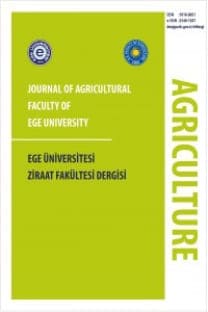Kentsel Kimlik ve Kentli İlişkisi Üzerine Bir Araştırma
Kent kimliği, fiziksel kimlik kodları, Konak – Karabağlar
A Research on Urban Identity and Citizen Relation
Urban identity, physical identity codes, Konak – Karabaglar,
___
- AgulIar, D. M. A. 2002. Identity and Daily Space in Two Municipalities in Mexico City, Environment and Behavior, 34: 111 – 121 pp.
- Baloglu, S. and C. Love. 2005. Association Meeting Planners’ Perceptions and Intentions for Five Major US Convention Cities: the Structured and Unstructured Images, Tourism Management, 26: 743 – 752 pp.
- Karabağlar Belediyesi. 2014. Karabağlar, http://www.karabaglar.bel.tr, Erişim: Nisan 2015.
- Konak Belediyesi. 2015. Genel Bilgiler. https://www.konak.bel.tr, Erişim: Nisan 2015.
- Lynch, K. 1960. The Image of the City, USA: MIT Press, 194 pp.
- Malkoç, E. 2008. Kamusal Dış Mekanlarda Kullanım Sürecinde Değerlendirme (KSD): İzmir Konak Meydanı Ve Yakın Çevresi Örneği, Doktora Tezi, Ege Üniversitesi Fen Bilimleri Enstitüsü, Peyzaj Mimarlığı Anabilim Dalı, 245 s.
- Nasar, J. L. 1997. The Evaluative Image of the City, USA: Sage Publications, 181 pp.
- Newbold, P. 1995. Statistics for Business and Economics, Prentice Hall, New Jersey.
- Pol, E., E. Moreno, J. GuardIa and L. Iniguez. 2002. Identity, Quality of Life and Sustainability in an Urban Suburb of Barcelona, Environment and Behaviour, 34(1): 67 – 80 pp.
- Talen, E. and S. Shah. 2007. Neighborhood Evaluation Using GIS, Environment and Behaviour, September 2007, 39(5): 583 – 615 pp.
- TUİK. (2015) Adrese Dayalı Nüfus Kayıt Sistemi (ADNKS) Nüfus Sayımı Sonuçları, Türkiye İstatistik Kurumu (TUİK), http://www.tuik.gov.tr, Erişim: Nisan 2015.
- ISSN: 1018-8851
- Yayın Aralığı: Yılda 4 Sayı
- Başlangıç: 1964
- Yayıncı: Prof. Dr. Banu YÜCEL
İzmir’in Selçuk İlçesindeki Şeftali Bahçelerinin Gelir Yöntemiyle Değerlemesi Üzerine Bir Araştırma
Siyah Alacalar’ın K-Ortalamalı Kümeleme Yöntemi İle Sınıflandırılması
Çiğdem TAKMA, Öznur İŞÇİ GÜNERİ, Yavuz AKBAŞ
Şafak CEYLAN, Nilgün MORDOĞAN, Hakan ÇAKICI
Peyzaj Fonksiyonlarının Haritalanması ve Analiz Edilmesi; Foça İlçesi Örneği
Çiğdem ÇOŞKUN HEPCAN, Şerif HEPCAN
Kiraz Oretiml5letmelerinde Etkinlik Analizleri: Çanakkalelli Lapsek ilçesi Örneği
İzmir-Urla Bölgesi Tarım Topraklarında Doğal Radyoaktivitenin Belirlenmesi
Zeynep DUMANOĞLU, Damla IŞIK, Hakan GEREN
Kentsel Kimlik ve Kentli İlişkisi Üzerine Bir Araştırma
İpek ALTUĞ TURAN, Bahriye GÜLGÜN
Kiraz Üretim İşletmelerinde Etkinlik Analizleri: Çanakkale İli Lapseki İlçesi Örneği
Duygu Aktürk, Murat Metiner, İlkin Shırvanlı, Batuhan Çobanoğlu
